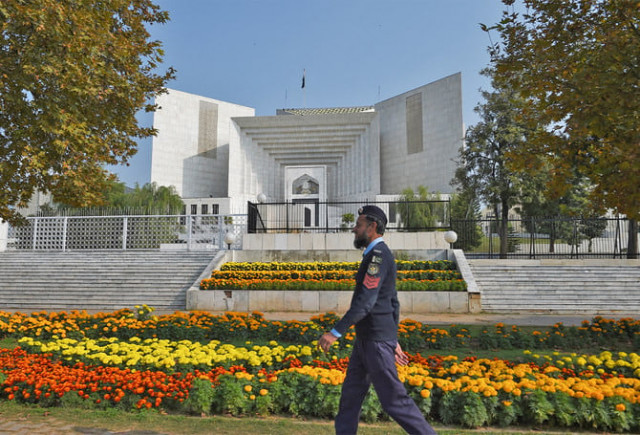‘Spotless character’ of servicemen a must
Court dismisses plea for reinstatement to police following acquittal in murder case

The Supreme Court has held that any person who wants to be part of the disciplined force should be a person of utmost integrity and uprightness with unimpeachable and spotless character and clean antecedents.
The courts remarks came in an 11 page judgment, authored by Justice Muhammad Ali Mazhar, on a petition filed by a police official, who wanted his reinstatement to the service in the Punjab police on account of his acquittal in a murder case.
While dismissing the petition, a three-judge bench of the apex court led by Chief Justice of Pakistan Umar Ata Bandial, held that the police force was a disciplined force with cumbersome accountability and responsibility of maintaining law and public order in the society and populace.
It referred to matter to the Punjab police “to examine fairly and equitably whether the petitioner has been completely exonerated or not and his further induction may not become a constant threat to the discipline of the police force and public confidence”.
A person having criminal antecedents would not be fit to be restored or reinstated to his previous position or post, the bench ruled, while dismissing the appeal against Punjab Service Tribunal which had rejected the plea regarding reinstatement of the petitioner.
“The functioning of the Police is required to be professional, service oriented and accountable to the people by re-defining its role, its duties and responsibilities so far as prevention and detection of crime and maintenance of public order is concerned,” the court said, referring to the Police Order, 2002.
“If the acquittal is found as a result of extending benefit of doubt or some other technical reasons, there is no bar for initiation of departmental enquiry and it is the prerogative rather an onerous responsibility of the employer to consider nature of offence for an appropriate action interdepartmentally.”
The court also said that the rationale and astuteness of initiating disciplinary proceedings by the employer was to unmask whether the charges of misconduct levelled against the delinquent were proved, and in case his guilt, what action should be triggered against him under the applicable service laws and rules.
“The object of criminal trial is to mete out punishment of the offences committed by the accused while departmental inquiry is inaugurated to enquire into the allegations of misconduct in order to keep up and maintain the discipline and decorum in the institution and efficiency of department,” the ruling said.
It added that in the departmental inquiry, the standard of proof was that of the “balance of probabilities or preponderance of evidence” but not “proof beyond reasonable doubt”, which was required in criminal trial in the wake of severe potential penalties.
The apex court has already held that a civil servant cannot escape departmental proceedings or consequences on account of his acquittal or exoneration on a criminal charge, arising out of the same transaction; saying that these two are entirely different jurisdictions with different standards of proof.
Thus, state’s failure on criminal plane did not provide shield of double jeopardy to a delinquent officer, the court said. This court had held that a civil servant might not save his job in the event of acquittal as the department still had reasons to consider his stay in the service as inexpedient, it added.
“There are additional reasons to disregard his acquittal inasmuch as criminal dispensation of justice involving corporeal consequences, comparatively, requires a higher standard of proof so as to drive home the charge beyond doubt, an exercise to be routed through a procedure stringently adversarial,” it said.
“Therefore, factuality of the charge notwithstanding, procedural loopholes or absence of evidence, sufficient enough to sustain the charge, at times occasion in failures essentially to maintain safe administration of criminal justice out of abundant caution.”
Departmental jurisdiction on the other hand, it continued, could assess the suitability of a civil servant, confronted with a charge through a fact-finding method, somewhat inquisitorial in nature without heavier procedural riders, otherwise required in criminal jurisdiction to eliminate any potential risk of error.



















COMMENTS
Comments are moderated and generally will be posted if they are on-topic and not abusive.
For more information, please see our Comments FAQ